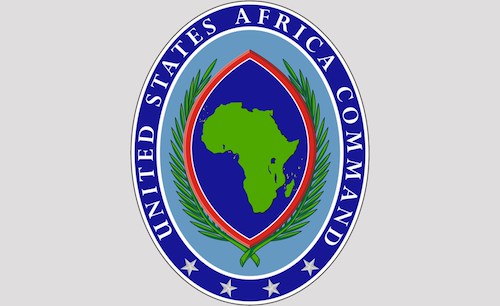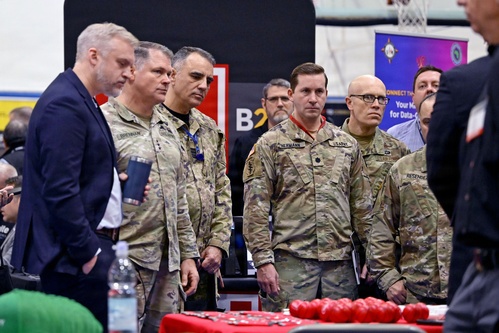The trigger was the outcome of an election. The original cause of the violence runs deeper.
In January 2008, international news showed images of bloodshed, violence and hordes of people being forced to flee their homes in fear of their lives. From Nairobi to the Great Rift Valley in western Kenya, more than 1,000 people were killed with many more injured.
Almost one year after the violence wreaked havoc principally in the Upper Rift Valley, the U.S. government is partnering with Kenyan government agencies to bring about lasting peace. Today in the Rift Valley, Kenyans and Americans are working with a host of non-governmental organizations along with the militaries of both countries. Each organization has expertise it can bring to help solve the challenges of tribal conflict; but the key is using them to affect positive and lasting change.
Tensions have flared between the Kikuyu and the Kalenjin, two major tribes who call central Kenya home, over land rights for more then 100 years. These tensions reached a boiling point after the results of the last Kenyan presidential elections were released at the end of December 2007.
The Kalenjin, angered by what they perceived to be a fraudulent outcome, mobilized and raided the homes of Kikuyu families, burning houses to the ground, destroying crops and livestock, and terrorizing anyone who they thought should not live in the Rift Valley.
The post-election violence centered on Eldoret, the largest city in this part of Kenya, but spread hundreds of miles through the valley region and even affected the capital city of Nairobi.
In the midst of the violence, even before all the fires were extinguished, one man, Bishop Cornelius Korir, the Roman Catholic Bishop of Eldoret began to look for ways to heal the scars left on the people who live in this lush region of east Africa.
He quickly found himself in the middle of the conflict.
"Shortly after the violence Kikuyu (tribes people) came into my parish for sanctuary. There were thousands of people in this little area, but I turned no one away. Everyone who needed the safety and sanctuary of the church were welcomed in. It didn't matter if they were Catholic or not, their safety was my only concern," Korir said.
While schools and houses were still burning, he provided a safe haven for the Kikuyu. The Bishop stood toe-to-toe with the aggressors, his own tribesmen. Korir is a Kalenjin, and risked his own life in order to save others.
According to the United States ambassador to Kenya, Michael E. Ranneberger, Korir is widely respected, which is why the angry mob did not breach the dioceses' walls.
"When the violence occurred, the bishop hosted about 3,000 people right there at his residence and at the cathedral and gave people sanctuary," Rannenberger said. The bishop has played a positive role in the Rift Valley, for decades, the ambassador said. "When previous violence happened in '97 and '92, he was involved then as well. He is respected by all sides, Kikuyu and Kalenjin."
With the violence flaring, Ranneberger arrived and mobilized his team to assist the people in the Rift Valley.
"In the aftermath of the violence we have moved in what I consider a holistic approach," said Ranneberger, who, before assuming his current post in 2006, had been the Senior Representative on Sudan for the State Department Bureau of African Affairs. "We are trying to deal with all the different elements that led to the violence in the first place. We are involved in supporting the return of internally displaced people to their home area."
"The United States has provided a massive amount of humanitarian assistance, but we are also providing assistance to farmers so they will return to their lands," Ranneberger said. "We are giving them seed packages to restart livelihoods. We also have a program to promote reconciliation at the grass roots level, creating dialogue between the communities."
The United States Agency for International Development is implementing this program, he said. As the reconstruction teams made their way into the Rift Valley, they began steering a course for reconciliation. Brendan Barthes, a program manager with the USAID Office of Transition Initiatives, went to Eldoret within a couple of weeks of the onset of the violence to assess the situation.
His office bridges the gap between the initial response teams, who hit the ground right after a disaster, and the long term assistance programs USAID normally manages.
.
Barthes said the most powerful tool he has is flexibility in deciding what relief efforts to put in place
"We have a small amount of resources, but a great deal of freedom in how we use them to address a country that is going through some type of transition. Whether it is democracy into development, disaster into relief, anarchy into stable governance, authoritarianism into democracyywhat we do is cut small in-kind (material) grants on the ground on a rolling assessment basis trying to identify what local government and local civil society need. It is about what we can do to help them in this transition," he said.
The ambassador also sought help from the U.S. military in the form of manpower, equipment and expertise. He looked north to Djibouti, where Combined Joint Task Force Horn of Africa (CJTF-HOA) is headquartered. They had teams who specialized in rebuilding war-torn nations.
"I looked around to see how the United States could make the biggest impact and I knew CJTF-HOA could play an important role, helping to rebuild the Rift Valley," said Ranneberger. "We worked with the military to get the right team of people into the valley and to figure out how we could help affect long term and short term change for the better."
Rear Adm. Philip H. Greene, Commander, CJTF-HOA believes the on-going projects in the Rift Valley are the epitome of the military's "Three D" doctrine of defense, development and diplomacy.
The idea is for government and non-governmental organizations working together towards a common goal.
"The Rift Valley project we are engaged in is a great example of working within the '3-D' architecture. It is a unity in government effort, working in conjunction with our partner nation, in this case the Kenyans, on a project for reconstruction and reconciliation following a difficult period in this region where there was political strife."
In Kenya, CJTF-HOA has a small team of soldiers working in Eldoret. They are members of the Delta Company, 412th Civil Affairs Battalion, a reserve unit deployed the to the Horn of Africa since late 2007. The last few months they have been working with the local community helping with the recovery efforts.
The civil affairs groups are small teams with varied skill sets. Almost all of them are composed of reservists and their mission focus is sharply defined. Capt. Paul Deis, the team's leader believes this narrow focus helps the team perform successfully and productively in the short period they are working in the Rift Valley.
More than 90 schools were destroyed in the post-election violence, most in Kikuyu communities. The team selected 12 schools in the valley to concentrate their reconstruction efforts.
"We decided to rebuild the schools destroyed in the post-election violence because they are essential to both the Kikuyu and Kalenjin communities," Deis said.
"A committee made up of Kenyan officials from the Ministry of Education, Kenyan Ministry of Defense, provincial and local leaders, along with various NGOs and members of my team met many times over the course of a few months to examine which schools to rebuild.
"The schools we decided to work on had to meet certain criteria prior to us agreeing to work at them. There had to be a mix of both tribes at the schools. A reconciliation process had to be in place, a peace council of the village elders had to be working to discuss issues as they came up. The third set of criteria was for the government of Kenya to approve of us working in a particular community."
The team found it very easy to work with the local Kenyans, Deis said.
"Our military uniforms gave us instant credibility here. Like the United States military, the Kenyan military is well respected and is one of the most trusted government organizations in Kenya. The people view the Kenyan military as fair and impartial. That same respect was conferred on my team and really allowed us to operate effectively right from Day One."
The Kenyan military assigned their own engineers to take the lead on schools in the northern areas of the valley. Lt. Augustine Ouma leads a team of Kenyan military engineers in Cherangany, leading the rebuilding efforts in two schools there.
"At first we were deployed here to restore a sense of normalcy in the general area. The U.S. Army came up and has now helped us with the restoration of the schools' dormitories in the primary and secondary schools at Geta," Ouma said.
The projects varied from one school to another, but one element that remained constant is the effort to ensure both Kikuyu and Kalenjin each have a say-so in each school project.
"Each school's headmaster decided how to allocate the money for his or her school," Deis said. "Then all the supplies and laborers were acquired from within the community the school was in. We wanted the community to have a sense of ownership in the schools so there will be less of a chance of (competing tribes) burning them down in the future."
A lasting peace is the ultimate goal for everyone involved in this process. This peace process will only be settled through community dialogue. But a lasting peace is important not only for Kenya, but for the entire region.
Admiral Greene is keenly aware of the important role Kenya plays in this part of Africa.
"It is important not only for Kenya, but the surrounding countries as well, for Kenya to remain peaceful and stable. They are the economic powerhouse for this region," Greene said. "They are also a strategic partner of the United States and have been since their independence. As allies and friends we are here to support them and to assist all of our partner nations. "
CJTF-HOA's mission is to help build security capacity throughout the region, allowing partner nations to be self-reliant and improving regional stability. The task force headquarters is based at Camp Lemonnier in Djibouti.




